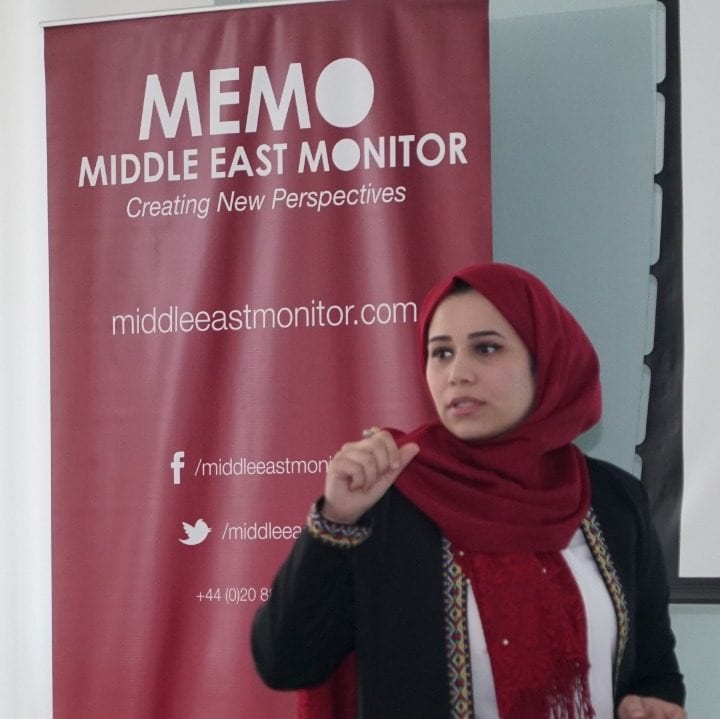Manar Khalawi has no doubt that she will meet her fiancé soon. Theirs is not a normal engagement, however, because Osama Al-Ashqar is serving a life sentence in Israel’s Ramon Prison. He was arrested in 2002 and sentenced to eight life terms for leading the military wing — Al-Aqsa Martyrs’ Brigades — of the Palestinian National Liberation Movement, Fatah, during the Second Intifada.
Full of energy, determination and hope, Manar is a young Palestinian from Bethlehem who lives in the village of Wadi Rahal in the south of the occupied West Bank. She has a BA degree in Media from Hebron University, and she is now studying for a Master’s in Israeli Studies at Al-Quds University in Jerusalem.
“I grew up, like other Palestinian girls, in an occupied land where we witness the effects of the occupation every day,” she told me. This includes not being able to meet her fiancé, as would be the norm elsewhere.
She and Al-Ashqar got engaged in 2019, after she got to know about him in 2016 through a relative of hers who shared a cell with Osama in prison. “My cousin, Bahaa El-Din Odeh, was injured at Ramon Prison and Osama took care of him,” she explained. “From that day, his name began to shine in our family.”
Her own research revealed how much he had done for the Palestinian cause. “The prisoners are not just numbers. We have to know their story at least. Osama, for example, was arrested when he was just 20 years old.”
READ: ‘I refused to join the Israeli army, it justifies violence and inequality’
Getting engaged was not an easy decision, but she convinced her family that it was the right thing to do. “What encouraged me to take this step is my belief that prison will not be forever, and his sentence will end someday.”
![The launch of Osama Al-Ashqar’s book at the Commission of Detainees’ Affairs, October 2020 [Manar Khalawi/MEMO]](https://i0.wp.com/www.middleeastmonitor.com/wp-content/uploads/2021/01/engamement.jpg?resize=1200%2C787&ssl=1)
The launch of Osama Al-Ashqar’s book at the Commission of Detainees’ Affairs, October 2020 [Manar Khalawi/MEMO]
“I have never visited or seen Osama because I’m not a first-degree relative,” said Manar. “Visits are only for the prisoners’ parents, children or wives, and even they are sometimes prevented from visiting. I know Ghufran Zamel, who has been engaged to a prisoner for more than 10 years and has never seen him even once.”
![Ghufran Zamel and Hasan Salama, engaged for ten years [Ghufran Zamel/MEMO]](https://i0.wp.com/www.middleeastmonitor.com/wp-content/uploads/2021/01/Palestinians-engaged.jpg?resize=1200%2C787&ssl=1)
Ghufran Zamel and Hasan Salama, engaged for ten years [Ghufran Zamel/MEMO]
“We face an occupier who targets our existence and our life in every way,” Ghufran told me. “When they sentence the Palestinian prisoners, they want to make sure that their life outside the prison walls comes to an end.”
The decision by Ghufran and Hasan to get engaged was an effort to reclaim control over their lives from the occupiers. “The social and psychological aspects of life are a very important part of facing up to the Israeli occupiers,” she pointed out.
It may be hard for us to understand why young women like Ghufran and Manar get engaged under such circumstances. Or maybe not, if we know that Ghufran herself is an ex-prisoner. She was arrested and imprisoned for more than a year for exposing the crimes of the Israeli occupation and the suffering of the Palestinian people in her articles for a Palestinian newspaper. “I was held in the interrogation cells for more than two months, alone and completely cut off from the outside world. I knew nothing other than whether it was day or night.”
READ: Journalist arrested after exposing the plight of Palestinians in Israeli prisons
Moreover, Ghufran grew up in a home which has suffered severely from the Zionist occupation. Her three brothers are a prisoner, a martyr and a deportee. “Our home was full of Palestine love. My family was ethnically cleansed in 1948 at gunpoint in the midst of murders and massacres. We ended up living in a refugee camp in the West Bank.”
Ghufran’s engagement can be seen, perhaps, as a message to the Israelis: “You robbed us of our land and homes, but we will not allow you to take away our right to live, even behind your prison bars.”
Despite being engaged to Salama for ten years, the Israeli Prison Service refuses to grant her a visit permit because she is an ex-prisoner. “I tried several times to file lawsuits to obtain my right to visit Hasan, but they have refused every time.” At first, she wrote to her fiancé through the Red Cross. She heard his voice for the first time in 2012, when a recorded message was smuggled out of the prison.
Such unusual circumstances do not prevent the engaged couples from planning for the future. Manar’s fiancé published his first book, Prison has another flavour, last year, in which he talks about life inside an Israeli jail. This will not be the last public exposure for Osama Al-Ashqar and Manar Khalawi. Once he is released — and they have high hopes that this will happen — they plan to get involved in their own community project.
Ghufran Zamel and Hasan Salama, meanwhile, have built their own house in Gaza where they will live after he too is released. “We live with the hope that we will meet, and wait for freedom with patience and certainty that Allah will bring us together,” she said.
Such engagements of young woman and prisoners serving life sentences has become a national cause for solidarity with the prisoners. Is there any greater act of solidarity for a young woman than get engaged with a prisoner held by Israel not knowing if and when they will ever be united? Ghufran answered my question without hesitation: “The more difficult the struggle, the more glorious the victory.”


![Manar Khalawi holds Osama Al-Ashqar’s first book, October 2020 [Manar Khalawi/MEMO]](https://i0.wp.com/www.middleeastmonitor.com/wp-content/uploads/2021/01/engaged1.jpg?fit=1200%2C787&ssl=1)









